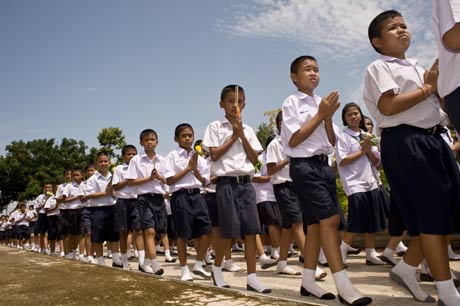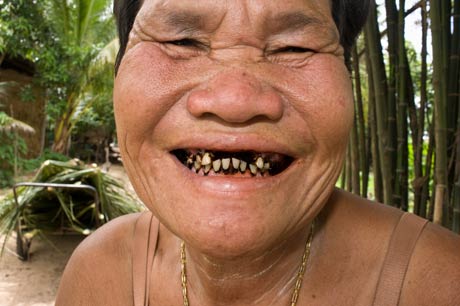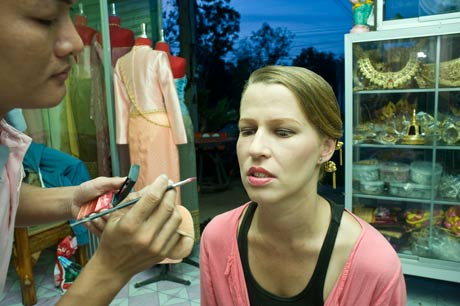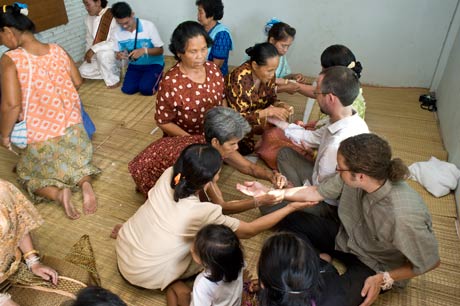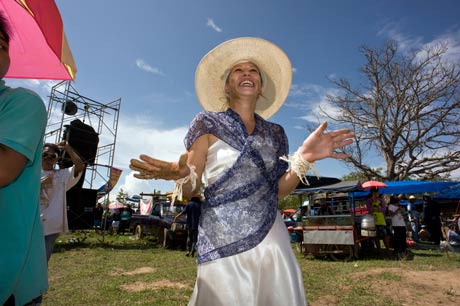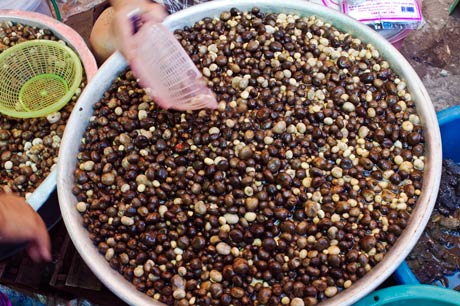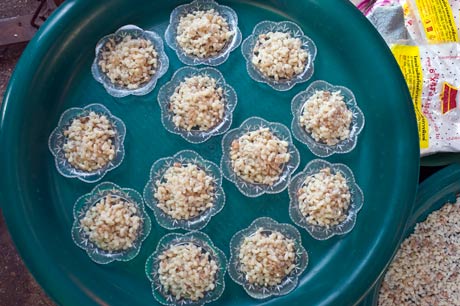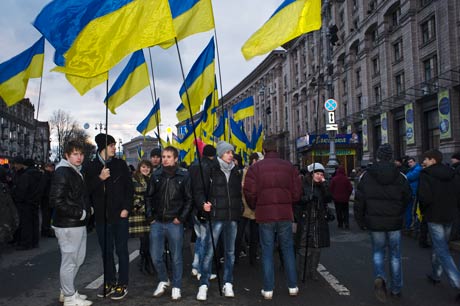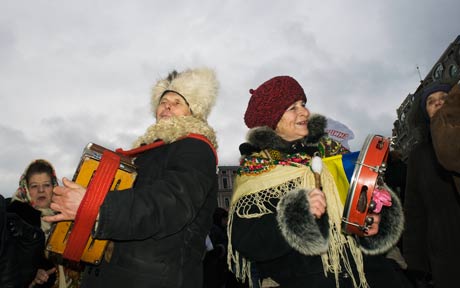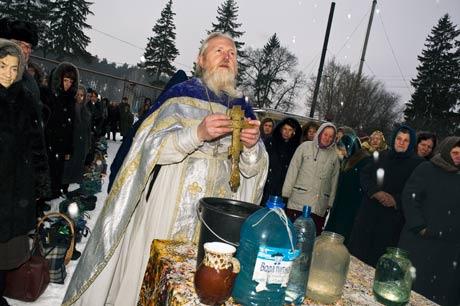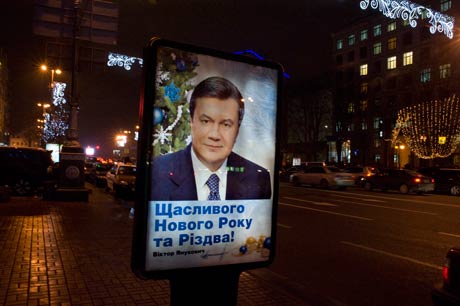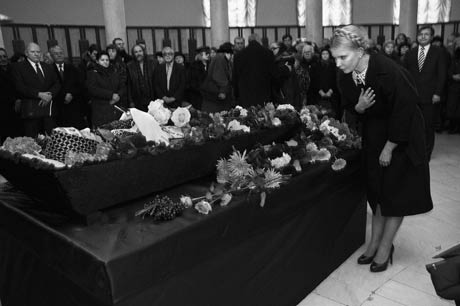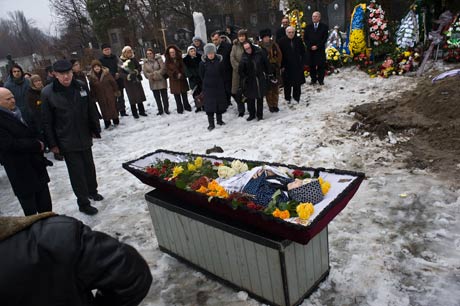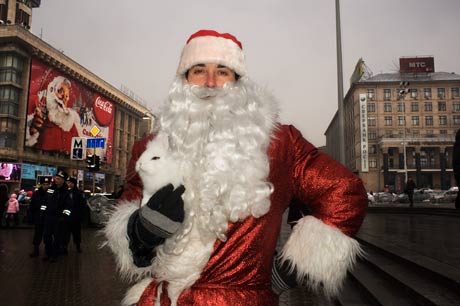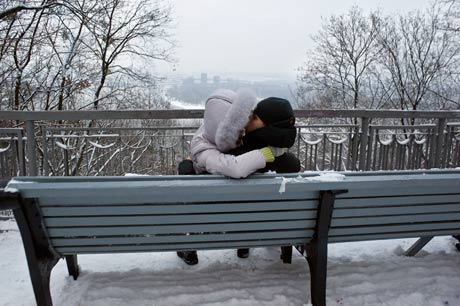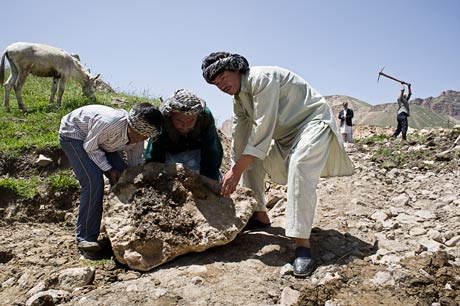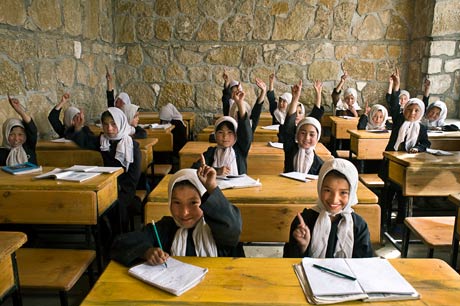Tagged: Dispatches
Letter from Thailand – I am a farang
I am a farang
All my friends went back to Bangkok and then home – all the farangs (Thai word for someone of European ancestry, no matter where they may come from) – except for me.
I stayed in the village of Nong Diang Noi Non Yai, the village where the wedding was celebrated. I stayed with the groom’s family. There were six of us; aunt and uncle, their two daughters, one still a schoolgirl, the second married, her husband, and I. Everybody only spoke to me in Thai, not realizing I do not speak it. I spoke to them in English, realizing they do not speak it.
Nong Diang Noi Non Yai village is near the town of Kantharalak, in Isaan province. It and all of Isaan is a breath of fresh air in all senses. It is Thailand’s poorest and most ignored province, which means no-one speaks English, and no-one offers you banana pancakes or tourist tat.
The family, after a long time persuading them that I do not want to drive around on a motorbike but by bicycle, brought me one morning an old one with no brakes, though they made me very, very happy. I could peddle across a vast landscape, between rice fields and stop anytime I wanted to photograph people going about their everyday business. Business as they have done for centuries: growing rice, fishing, weaving silk, catching ant larva, making brooms and charcoal and grazing cows and buffalos.
Growing rice
In May before the raining season farmers at the Rocket Festival launched rockets to implore the God of Rain to shower the earth with abundant rainfall for the planting season. The Rocket Festival is an integral part of pastoral life as without enough rainfall crops will not grow. The majority of Isaan people are farmers even though the Isaan soil is poor.
So, after all the rockets were fired into the sky and rain-making rites and other ceremonies to pray for fertility of the land were done, the rice-planting season started.

Rice seeds are planted before ploughing; then again after soil is ploughed just to be sure some rice seeds will catch on and will grow.
While flooding is not mandatory for cultivation of rice, all other method of irrigation require higher effort in weed and pest control during growth periods and a different approach for fertilizing the soil.
Unfortunately I could not find out what kind of chemicals these farmers use, or if it is fertilizer or weed killer. Whatever it is, it makes me always think when I ate rice (mostly 3 times a day) that chemicals are used helping rice grow. There is no distinction between the dishes eaten for breakfast, lunch and dinner. Spicy stir fried vegetables with sticky rice are just eaten in the morning as in the evening.
Fishing
To supplement their income women often make fishnets by hand and men do all fishing.
Not only fish are caught but also frogs, ant’s larva, snakes and many types of insects. These and fish can be sold in the market or consumed by the family – the catch is an important sort of protein.

An elderly couple collecting charcoal they made. Gas is used for cooking in most towns, but villagers usually use charcoal or firewood.
Euro 2012 started, but no one was interested in “my” village. They watched on TV Muy Thai or Thai Kickboxing, Thailand’s ancient martial art. It is known as the “Art of Eight Limbs” and is the national sport of Thailand. I went once to see it live, where all categories, from children to adults fought.
I also participating celebration of Visakha Bucha Day or the Buddha’s Birthday or Buddha Day. It isthe most holy time in the Buddhist calendar; it commemorates the birth, enlightenment and the passing away of Gautama Buddha the founder of Buddhism. Students in Kantharalak visited Buddhist Vat on Friday, three days before the D-day. They brought food and sweets for monks and they prayed. After prayers they went around the temple three times.
For the D-Day I was in Bangkok because I had to go to the Indonesian Embassy to apply for a visa. I went to Suwan Buddhist Vat where people brought gifts to Monks, where they prayed, and where they were given gifts from monk as well.

Thai couple poses for a photo in Suwan Vat on the Visakha Bucha Day on June 4th. They hold baskets full of gifts to monks.
You must already feel my Thailand trip is at the end. I got the Indonesian visa and on June 14th I am off to Banda Aceh, Indonesia through Kuala Lumpur, Malaysia.
I should still mention that I wanted to photograph buffalos, an animal that is very photogenic. But I was afraid to go closer to it, and not having a zoom but just 20mm and 28mm lenses, there is no closer shot of this magnificent animal. Most farmers use the plowing machine, which replaced buffalos. It acts as a tractor and pulls a trailer. The iron-spike wheels can be changed for tires.
What else should I say. Yeah, the Isaan kitchen is much hotter than Thai kitchen. So first Isaan dishes drove tears into my eyes. When I, by accident, ate chili pepper, the family died of laughter while I was screaming like a lion into the air.
I should still mention that mostly elderly woman chew “betel” – areca nut wrapped in betel leaves, called by local’s “mak”. It had driven me crazy when an auntie spat her betel juice out. Red colour saliva looked like splotches of dried blood on the ground.
The young people find betel chewing no longer socially acceptable. Also modern social taboos such as spitting, have contributed to the decline of betel chewing. Despite a decline in the custom, the betel chewing still remains in country-side areas, where it’s use for medical and cultural purposes, and where women chew betel for social affability, in a similar way to us farangs drinking coffee together.
I must say good-bye to Buddha and hello to Allah so I am off to Indonesia, the biggest Muslim population it the world.
Letter from Thailand -The Wedding
The Wedding
The big day started at three o’clock in the morning. We went to the hairdresser not only to get our hair done but also to be dressed in traditional wedding costumes. It was still dark outside, we were half asleep, and the corner store was still closed, so there wasn’t a beer for waking us up.
At home wedding guests were already waiting for as and the ceremony started immediately.
Food was served after the fais were all on our wrists. We sit on the floor, eating all Thai goodies with sticky rice. I was busy eating so there are no photographs. But I beg you to use your great imagination and picture this feast. Then the big shoot of portraits started. I brought my mobile “seamless’ and we hung it inside of house. It couldn’t be outside because that would be bad luck.
Then we had to rush to the car, no one understood why and where we are going, they said to fireworks. We were packed like sardines on the truck, food, beer, rum and drinking water in a container were taking up the little space we have for ourselves.
I found out later were we went. We went to Yasothon, the smallest province in the lower northeast of Isaan region. And it wasn’t for any fireworks but a Rocket Festival, which is celebrated each May at the commencement of the Rainy Season. The home-made rockets were fired into the sky paying homage to the God of Rains.
Everybody was drunk there; people were betting on rockets, the winner was which get the higher into sky. It was a big spectacle with dancing, screaming in excitement, talking, drinking, eating. And everybody was crazy about us farangs.
Suddenly we had to leave. The family was getting worried about us, some of us were already quite drunk so they decided it’s time to go home, and continue to celebrate the wedding.
And how did the wedding end? With a dance to Thai and Czech music.
Letter from Thailand – Before the Wedding
Before the Wedding
Back in Bangkok, just for couple hours before we are off by train to Isaan – the northeastern region of Thailand. We got off in Si Sa Ket, then continue to Kantharalak by bus. In Kantharalak one of the groom’s family members was waiting for us with a track. We had still 30 km to go to the village of Nong Diang Noi Non Yai.
There are 2 days left before the wedding. Not much is happening; no kind of preparation – no food is cooked, no decoration is done, everything, most of it will all be done the day before the big day. So we relax, drink beer, local rice “vodka” and Sang Som, a local rum.
A day before the wedding women started to make a Buddhist POT. Leaves of banana are cut, small flowers are added. And then all this is ensemble together.
The bride and groom with two witnesses and farangs (Thai word for someone of European ancestry, no matter where they may come from) went to the authority’s office, where the marriage was officially signed.

and now Martina and Jet are officially married.
After the official wedding, we went to the market to buy food for the wedding, in the back of a pickup truck, the way everybody travels in Thailand.

Going to the market in the back of a pickup truck.
In the market there were many things to choose from:
I should not forget alcohol – beers, local rice “vodka’” and rum were bought as well. All this was put on the truck, between us.
For the family, kitschy pictures of Prague were printed and framed.
We wanted to sleep early because the big day started the next day in the early hours. But cooking went on; villagers were visiting or just were coming to see so many farangs in one place at the same time, a rare occasion.
I am exhausted, good night everybody, will continue shortly, will continue shortly, will…
Letter from Thailand – I am a tourist
I am a tourist
I went to Thailand to photograph the wedding of my friend Martina. I didn’t go alone but with other friends of her’s. The wedding was scheduled on May 19, 2012 but we arrived in Bangkok two weeks earlier. We were five but only four were staying for the wedding.
We didn’t fly to Bangkok together; everybody was coming with different air companies and by different routes and times. Do not ask me why. It just happened this way. I was flying with AeroSvit Ukrainian Airlines (which I would not recommend to anyone), arriving at Bangkok airport at three o’clock in the morning. Peter was arriving the same day but four hours later and I should wait for him. So I was wandering across the airport, I bought couple beers, but time didn’t move. I bought more beers till my eyelids were getting heavier and heavier and eventually they just shut down and I couldn’t open them anymore.
Peter arrived, the future bride came to meet us, they looked for me but I was nowhere to be found – I was sleeping heavily in a far corner with other travelers, homeless and airport workers. Luckily, my angel woke me up and I rushed to look for my friends, worried that they may have left the airport without me. They did not. We found a cheap hotel, one room for all, with one double bed, some will have to sleep on the floor.
The future bride and groom introduced us to their Thai friends and a beer marathon started and it lasted for three days. What else to do in Bangkok, where the temperature and humidity are very high. Jet, the future groom, works at an ice distribution centre. In this heat ice cubes are in high demand, employees work from early morning to late night.
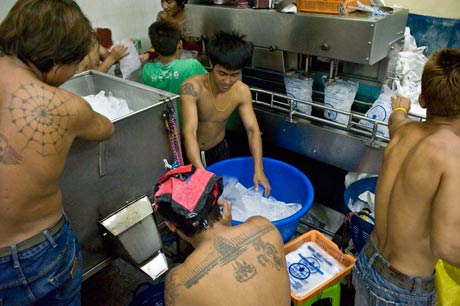
Thailand is a tropical country with sunshine and high temperature all year long, so ice is very necessary for its people.
When everybody arrived in Bangkok we jumped on the train and then a bus and finally arrived to Khao Sok – rainforest resort. In the tourist guide it’s written, “more than 48 species of mammals, 184 species of birds and thousands of species of trees and plants have been recorded there.” We went to see waterfalls where on the footpaths leeches were waiting for us. And there were millions of them.
The waterfall was a kind of rapid or maybe we just didn’t get to the right one. There was frogs’ music during the night and one burglar, who checked some backpacks and took only local money. I guess he was a Buddhist thief.
From Khao Sok we moved to Koh Lanta. We travel all day, changing one bus after another, then minibus to ferry, exiting at the beach for a swim. Well…when we arrived we find not a sandy beach but a coral one…it was ebb tide.
We stayed one week, went to the sandy beach, traveled around the island on motorbikes, ate well, drank well, but for my taste… I do not like to be a tourist, not staying in one place long enough to know it well, to know people well…

A portrait of a sea gypsy in the village of Sang-ga-u in the south east corner of Koh Lanta. Sea Gypsies or “Chao Ley” (people of the sea) used to live a semi-nomadic lifestyle in the Andaman Sea; these seafarers of Indo-Malay origins were also the first settlers on the island some 500 years ago.
I wished I could stay longer in this small Koh Lanta Island and become a friend of the sea gypsies. But we were on move again, this time to a really touristic area – Phi Phi Island. We travelled by boat with all the tourists, meeting another boats full of tourists as well.
Phi Phi village is very, very, touristic. We had bungalows far from the center, though the music was so loud all night – ok, it finished at 3:00 a.m. – there were some seriously stupid show, the same each night and the same music as well. Ah, Phi Phi Island, I did not like you and I was wasting the little money I had on you.
We took a boat trip to other islands. The first stop was on the Monkey Island. Monkeys were supposed to be friendly to human tourists. But with our group they were not friendly at all. Well, in the beginning it looked like they might like us.
But then one jumped on me… and other one grappled Peta’s hair…and it wasn’t funny anymore.
The next stop was ….boy do not know the name but I felt whole of the world is snorkeling there.
I must say I was very happy to go back to Bangkok, from where we were going to Isaan….the wedding.
Letter from Ukraine IV, 2011
Privet (Hi) from freezing Kyiv for the fourth time
New protests kicked off the year 2011. The statue of Josef Stalin was blown up on New Year’s Eve in Zaporizha (western Ukraine). On January 14, a protest was held at the Presidential Administration building against recent arrests of mem-bers of nationalist groups who claimed responsibility for decapitating the bust of Josef Stalin in Zaporizha on December 28, 2010. On January 17, citizens took to the streets to prevent the government from shifting the tax burden to small and medium-sized businesses.
Yanukovich was promising a five-year tax holiday for small businesses during the 2010 presidential election campaign and one year later, he’s accusing small business owners of trying to avoid paying taxes. Furthermore, he promised to respect laws but rolled back media freedoms, banned peaceful protests and is said to have fixed the nationwide local elections.

Citizens took to the streets to prevent the government from shifting the tax burden to small and medium-sized businesses.
The events of Unity Day (Den Sobornosti) on January 22 have revealed how divided Ukraine is. The Kyiv City Administration received 20 applications for holding different rallies in Kyiv on that day. Civic leaders and Yulia Tymoshenko, for example, called on citizens to gather on Kyiv’s St. Sophia Square to support demands for early parliamentary elections. Yanukovich and his allies organized an all-day concert on Maidan Nezalezhnosti (Independence Square) where attendees were paid 120 Hryvnas to be there. But many people for some reason were not paid the bribe, so they stormed one of the Ukraine’s Regions Party offices and demanded their money. It is really the terrible poverty that makes people to stay and hold the Ukrainian flag – they can earn 120 Hryvnas ($15) for standing seven hours on Maidan Nezalezhnosti.
I spent most of the time at Tymoshenko’s rally where speeches were delivered, where folklore music and theater were played, where newspapers and pamphlets were given away and where Tymoshenko demanded parliamentary elections to be held this year or else a peaceful revolution will topple the president and his government.

Followers of former Prime Minister Yulia Tymoshenko gather together on Kiev’s St. Sophia Square to celebrate Unity Day on January 22. It was on this day in 1919 that the Ukrainian National Republic united with Western Ukrainian National Republic to form a short-lived state.
Moscow police have closed the only Ukrainian library in Russia, confident that now it can do so without objections from the Yanukovich government in Kyiv. Like the Soviet predecessor, the Russian government has never been supportive of the more than five million ethnic Ukrainians living in Russia, refusing to open any Ukrainian-language state schools even as it has complained about the closure of some of the many Russian-language schools operating in Ukraine. A small number of citizens demonstrated in front of the Ministry of Foreign Affairs against the library closure.

A small number of citizens demonstrated in front of the Ministry of Foreign Affairs against the library closure.
On January 27, a demonstration against political repressions was held by one of the grassroots organizations, the Tryzup (Trident – a Ukraine-wide nationalist organization) in front of the Ukrainian Federal Prosecutor’s Office in Kyiv. Seven activists of the Tryzub were arrested for beheading the bust of Stalin on December 28, 2010. Later on, more members of Tryzub were detained.
The Kruty Heroes’ Remembrance Day on Jan. 29 has shown how Ukrainian the opposition groups are divided as well. First, in the morning of that day Julia Tymoshenko and her supporters laid flowers honoring all of those killed at the Askold’s Grave in Kyiv. Later, the Ukrainian People’s Party with The Tryzub (All-Ukrainian Association) did the same. Why they didn’t do it together, only they know.
Who are the Kruty heroes? It all happened 93 years ago (January 29, 1918), when students fought the Bolsheviks, defending the Ukrainian People’s Republic near the village of Kruty where all of them were killed. Throughout the years, the true story of the battle was hidden from the view by the Soviet Government. Even today, Vladimir Putin the Russian Prime Minister is not happy about the Kruty Heroes Remembrance Day.
Tymoshenko’s investigation continues and journalists and a small number of supporters always wait for her in front of the Prosecutor General’s Office no matter if it is snowing, freezing or raining.

A supporter of Yulia Tymoshenko, former Prime Minister, holds a photograph ofTymoshenko in front of the Prosecutor Generals Office on January 18. Prosecutors launched criminal cases against Tymoshenko, accusing her of abuse of power by misspending government money when she was in power.

Opposition leader Yulia Tymoshenko is surrounded by journalists and supporters in downtown Kiev on January 25, 2011 before being questioned by investigators. Mrs. Tymoshenko stands accused of misspending some $280 million in state funds while serving as prime minister in 2009. Tymoshenko denies all wrongdoing.
Ukraine has a long way to go. And it will not be easy. Democracy remained elusive, the global corruption survey shows that Ukraine has the highest level of corruption among the Newly Independent States. The Russian language and culture dominates in many parts of Ukraine (many, like Prime Minister Putin do not think it is a real nation); and there is no abiding law and order.
Ukraine has been carved up and suffered the two biggest tyrants known to mankind – Hitler and Stalin – and the paradox is that an explosion which destroyed a bust of the Stalin on 31 December 2010 is classified as an act of terrorism, instead of vandalism! Millions of Ukrainians have been murdered in war and forced famines. Two decades into its existence, Ukrainian still struggle for survival and nationhood.
Letter from Ukraine III, 2011
Privet (Hi) from Kyiv for the third time
When nothing is happening in the capital of Ukraine I roam the streets. The Kyiv Arch of Friendship symbolizing friendship between Russia and Ukraine stands near our house. The Arch is also called a rainbow or a Russian collar, depending on which political camp you belong to.
The National Museum of the History of the Great Patriotic War (1941-1945) is a huge complex commemorating WW II. Pictured here are some fragments of the sculptural composition in the memorial complex. The reliefs symbolize the Soviet (Ukrainian) people rising up against the Fascists.
I already mentioned that the authorities target opposition leaders and activists for investigation. Nearly a dozen allies of former Prime Minister Yulia Tymoshenko were arrested recently and investigations into her and allies continue at high pace. I showed my face at the Prosecutor General’s Office couple times when Tymoshenko went for her interrogation. Journalists and small number of supporters were waiting for her.
These supporters are not paid, there is no one to take down there names, and no one organizes anything there. It is more likely that only the journalists are paid for their work there – as hopefully I will be if I sell some of these images!
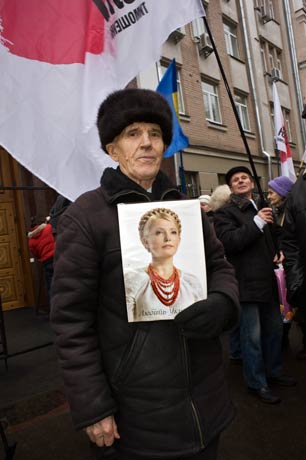
A supporter of Yulia Tymoshenko, former Prime Minister, holds Tymoshenko photograph in front of the Prosecutor General’s Office in Kyiv.
When Tymoshenko arrived supporters greet her and journalists interview her. Both groups wait till she leaves the Prosecutor General’s Office. And journalists interview her again and supporters continue to support her.

Tymoshenko is being investigated for alleged abuse of power during her tenure as Prime Minister. Tymoshenko denies all wrongdoing.
One of Ukrainian’s most important religious holidays, the day of the Epiphany, was celebrated on January 19. Early in the day a church service is held, then after the water is blessed the faithful take their bottles home and keep the water all year, which is believed to keep their home safe. After that the brave ones dip in the freezing water to wipe away their sins, to keep out evil spirits and purify the soul.
I didn’t want to stay for this religious holiday in Kyiv itself, so I went to the village of Zhuravka, in the Chernigivsk region, which is two hours drive from Kyiv by mashrutka (mini-bus). I arrived just in time for water to be blessed.
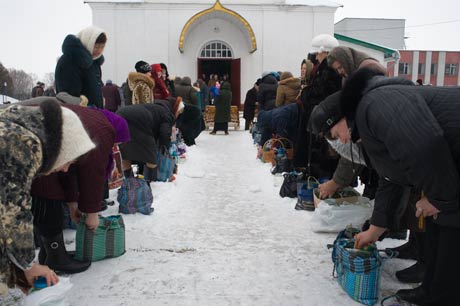
People wait outside Zhuravka church to receive holy water. The water is kept at home during the year to keep the home safe from fire, lightening and sickness.
It is very important to bath also in holy water to wipe away sins, keep out evil spirits and purify the soul. But there is no river or lake in Zhuravka. So I went with Larisa (an inhabitant of Zhuravka) on foot to the village of Polonki, about four kilometers from Zhuravka. Larisa sang religious songs during our walk. And she prayed a lot as well. She told me the story of her life. I must say her life is not a very happy one. She was sent to Chernobyl right after the explosion to cook for the people who came to clean up after the disaster. She cannot have children, probably due to radioactive exposure. She married to man from Zhuravka, but he drinks…

Larisa takes a dip in freezing water on the Epiphany Holiday. It is believed that a dip into freezing water on January 19 will wipe off all sins, keep out devils and purify a soul.
After icy bath, we filled up one bottle with the blessed water and walked back to Zhuravka. I stayed over night at one babushka’s. I was fed and drank well, I was very glad to be there and that I hadn’t stayed in Kyiv; it was raining there and when I returned everything looked very grey and depressed.
Letter from Ukraine II, 2011
Privet from Kyiv again,
Victor Yanukovich, the Ukrainian president, wishes a Happy New Year to all Ukrainians. Hopefully, it will be better than the last one. But Ukrainians are not so optimistic. Many young people would like to leave the country and each month it seems there are more pensioners and veterans who beg on the streets.
It’s warm and raining and lamb’s tails are sold on the streets. And we’re only in the middle of January. There was a little snow left on the hill of the Park of Eternal Glory last week. A few teenagers tobogganed under a twenty-one meter obelisk tower which is over the Tomb of the Unknown Soldier. These kids hope that the snow will continue; winter is no fun without snow. I also hope it will snow before the 19 of January, which is the day in of the festival of the Epiphany which would be much better with snow.
Mikhaylina Kotsyubinskaya, the Ukrainian patriot, literacy critic and the fighter for the Ukrainian language died. She was 79 years old. Friends and colleagues gathered to say goodbye to her on January 11th at Teacher’s House. Yulia Tymo-shenko came too. Then a mass was held at the church and then the last goodbye took place at the cemetery.
At the House of Teacher’s a letter of condolences was read. It was full of appreciation for Mikhaylina Kotsyubinskaya’s work, appreciation for her fight for the Ukrainian language and culture and much more. I do not remember all as it was quite long. The letter was signed by Victor Yanukovich. As the letter was read, the hall rustled uncomfortably and some people screamed “shame”. I was shocked too. It is true that Yanukovich lobbied in Ukrainian language during the presidential elections, but his first presidential speech was in Russian. One might suppose that Michajlina was turning in her grave.
I went to the village of Buyarka on an overcrowded train. It was terrible, we were packed like sardines so I thank God, Buyarka is just five stops from Kyiv. While there I visited three young girls who opened a business with horses. They have eight of them, and if you would like to learn how to ride a horse or just have a ride, then Buyarka is the place to go, but perhaps in summer, when it will be more pleasant.
The horses had to be brushed, their ankles tightened and then we could ride to the field. Those of us who joined the activities on foot had to run after the horses. It was very windy and we were freezing even though it wasn’t below zero.

If you would like to learn how to ride a horse or just have a ride, then Buyarka is the place to go.
I should mention I have started a new photographing project called Living Rooms. Here are some images I photographed so far:
Letter from Ukraine I, 2011
Privet from Kyiv,
It takes 24 hours by bus to get to Kyiv from Prague. I was lucky — our bus was half empty and all passengers had two seats and some even had four seats as I did. This was great as it meant I could stretch my legs across the aisle and sleep all night. Well, almost all night. A passenger in front of me reclined his seat as far back as he could so I was fully pinned to my seat in rather unpleasant proximity to the man’s sniffing. I cursed the one who invented reclining seats and believe they may be the cruellest innovation ever invented for travel in comfort.
I politely asked man if he could put his seat back and he screamed back to me that he can do whatever he wants and strangely enough, only when he realized I was not Ukrainian he moved his seat back to a normal position.
I went to Ukraine by bus last year and all the passengers were polite and friendly. Something seems to have changed. The New Year’s Eve celebration on Maidan Nezalezhnosti in Kyiv had an entirely different tone than the last year when people were dancing, singing and enjoying themselves. This year they stayed quietly on the square, opening their sparkling wine and sipping quietly. No one applauded when the Ukrainian president, Victor Yanukovich, gave his New Year’s speech and no one seemed excited. The spirit rose a bit when the fireworks started and occasionally someone cried out happily in response to the lights and explosion.
One positive thing was that the weather was good – the thermometer was on zero. It seems to me that freezing weather in Ukraine is reserved for presidential elections and revolutions. The weather was great all week and on Maidan Nezalezhnosti (Independence Square) Ded Morozes (Grandfathers Frost), Snegurachkas (Snow Maidens), Zajchiky (Bunnies) and figures form different fairy tales encouraged passers-by to take photographs with them. They wanted Hryvnas 30 (USD 3.50). Children could ride on a Merry-go-round or in carnival trains for free. Or they could persuade their parents to pay for pony rides. Those parents who couldn’t afford any of the attractions at least bought a balloon or inflatable toy for their child for 10 Hryvnas.
On Maidan Nezalezhnosti the Christmas celebration was in full speed and in the metro underpass babushkas made the best of the holiday as well. More passers-by meant more chances to collect money for their medications. Others were also begging, such as a veteran from the Afghan-Russian war who asked me for money for alcohol. When I asked him about the war, he cried.
Not everyone was there with extended hands — some babushkas played the violin while others were singing. Some were selling Ukrainian’s art crafts and souvenirs.
There was a demonstration in front of the Pechersky district court of Kyiv on January 5th where a criminal case has been opened against former Ukrainian Interior Minister, Yuriy Lutsenko. Yanukovich promised he will fight the misuse of power and impunity among members of the State apparatus. But it seems that criminal prosecutions are aimed exclusively at members of the opposition political parties.
About one thousand demonstrators, mostly pensioners, came to “support” Lutsenko. They held banners with slogans like “Today Lutsenko tomorrow you”, “We want fair court of law”. But these demonstrators were paid. They received about 30 -50 Hryvnas and the person who finds them received 30 Hryvnas and 5 Hryvnas more for each person he brought to the demonstration. Further, the organizer was paid 100 or even more Hrivnyas. Surprised? Don’t be, it’s normal in the Ukraine.
It was very cold this day with the therometer dropping to well below 0. The trial started at eleven in the morning and finished at about two afternon. While it was finished for Lutsenko at least that day, the demonstraters had to wait until six o’clock in the evening to collect their pay. The leader of the Batkivschyna Party and former Ukrainian Prime Minister, Yulia Tymoshenko, also came to support Lutsenko. She was not outside with the babushkas, of course. And it was probably she who paid these demonstrators. Surprised again? Don’t be, this is normal in Ukraine.
Maybe the young generation can change things; maybe the young generation will be more honest. But for now, it seems they are busy with something else.
Letter from Afghanistan V
Salaam,
I am still in Mazar-e-Sharif even though my visa already expired – on July 15. I sent my application to extend my stay for another month, but the process is very complicated and slow. I had to send my application with a copy of my school certificate; as well as a letter from the Embassy where my Afghan visa was issued. And I had to have invitation letters from the Czech NGO (Non Government Organization) People in Need from Prague as well as a formal request for my stay from my hosts in Afghanistan. All these documents were sent to the Ministry of Economy (PIN is registered there) a week before my visa expired. From there the application will be sent to Ministry of Foreign Affairs.
A couple weeks ago, visas could still be issued in Kabul as well as in Mazar-e-Sharif and others large cities. Not any more. All foreigners must go to Kabul. The authorities make it very difficult for foreigners. They seem to want us out of the country. And I have no news from the Afghan authorities yet about my application, so I really hope I will get some news soon.
Did I complain about weather in the last letter? I did, didn’t I? I guess it was too early; it was only 42 Celsius, nice and cool weather compare with what it is NOW! Believe it or not: it has been 48°C the last three days, yes, forty eight in shadow. Our thermometer only registers until 50 Celsius…..it’s crazy.
It’s not good to stay in the compound all the time, because you’ll go a bit nutty if you do. So I was lucky to have the opportunity to go on another field trip; even it was just for one day in the Toqay district, one and half hours from Kabul. Uzbek people live there, and women (most of them) do not mind being photographed.
The Afghan parliamentary election is scheduled to take place on September 18th (postponed from May 22nd). The campaign which kicked off at the end of June will be a major test of Afghanistan’s political progress and security. Depending on how it’s run, the Sept. 18th balloting could be a major advance toward stability; or, if there is fraud on the scale of last year’s presidential elections, a big step backward.
In Balkh province my “mission” for the Czech NGO People is finished. In Kabul, I will document a teacher’s training and hope also to document the parliamentary election campaign. My last shoot was in the Toqay district, the ISNA (Income Stability in Afghanistan) beneficiaries: a beekeeper, agriculture nursery and wool processing.
So goodbye Marghzar, goodbye Zare and Kishindeh. Goodbye Mazar-e-Sharif, goodbye Balkh. I am off to Kabul on Saturday.
iva
PS. And I have almost forgot, my visa application is already at the Ministry of Foreign Affairs and I will have an answer about my status in couple weeks.
Letter from Afghanistan II
Salaam from Afghanistan again.
My second field trip was to the village of Kishindeh. The road was very dusty due to construction. A new highway is being built; it will connect Mazar-e-Sharif (Balkh province) and Darae Souf (Samangan province).
Anything which stands in the way of the construction must go. Hills are leveled, houses are demolished. Shahib Nazar’s house for example will be devoured by the highway. Shahib told me he has to move in two weeks. He should get a new house from the construction company, but so far no one has told him where it will be. He is worried that he will lose his house and will not get a new one.
While the big highway is under construction, small roads are being created as well. These roads are made from rocks that the construction crew brings by hands. Shovels and pickaxes are used instead of big machines.
Afghan women didn’t want to be photographed. Actually, their men forbid them to be photographed. I was told by them that Islam religious doesn’t allow women to be photographed. I assume I could take a pictures but without their faces visible. So I did.
The harvest season has begun. In Afghanistan, men usually harvest grain manually with a sickle, a scythe is unknown here. Tractors are rarely seen.
I went to two schools; one was built by an NGO and the second is a state school which has one small room with one window and a blackboard. Pupils sit on the floor; there are neither tables nor chairs.
I think that schools, whether without or with tables, are good. It is good children go to school at all. But some do not like Fauzya (12), for example, and she is not alone; she doesn’t go to school, she doesn’t know how to read or write. She studies only the Koran in a mosque. I was told that she will be married to some old man when she is 15.
Bye for now
Iva

















